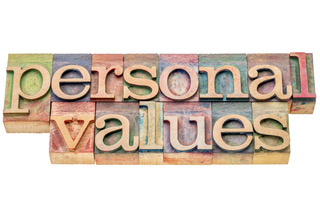What Are Your Core Values?

If you want to lead others, you need to know yourself first. And to know yourself you need to define and understand your set of values. Leaders that excel have a core set of values that drives how they act and how they show up, which in turn impacts how others follow them. In fact, studies shows that the ability to define one’s values is a characteristic of long-term success.
Imagine this scenario: You didn’t clearly communicate a timeline to product development for a project you are managing. Your customer is unhappy because they were expecting an install that didn’t happen. Due to the delay, they call your boss. Your boss asks you to find out why development isn’t doing their job. Do you speak up and let her know it was your fault or do you keep quiet and try to push this off on product development?
Work and life will always present as a series of choices and no matter where you personally fit in an organization it is critical to spend the time to define your values. Knowing your values will play a key role in grounding you as an individual or when you are under pressure, presented with challenges and having to make the right choices. As well, they are important to understand so that you can continually assess your values against your organizations to make sure they are aligned.
So what is a value?
It’s a person’s principles or standards of behavior and it’s one’s judgment of what is important in their life. For example, a leader who values integrity might speak up if they believe there is wrongdoing by a team member. Another leader who values loyalty might overlook this same situation.
Think about leaders you admire – what individual and relational values do they show up with? Here are a few to think about.
Individual Values
Accountability, Adventure, Balance, Character, Competency, Creativity, Curiosity, Genuine, Humility, Humor, Influence, Initiative, Integrity, Knowledge, Loyalty, Positivity, Risk, Service, Spirituality, Wisdom ….
Relational Values
Authenticity, Caring, Compassion, Collaboration, Connection, Diversity, Graciousness, Honesty, Kindness, Listener, Trust, Respect….
If you want to be a leader it is critical to start defining what is important to you because your values will be the key to helping you grow and develop. Understanding them will help you create and move toward the future you want. Some of your values will be non-negotiable and stay with you over the course of your career, like trust or honesty. While others may develop as you further your career or mature, like risk tasking or balance.
While this concept may seem simple, many professionals don’t take the time to think about how they currently show up or want to show up at work – they are too busy just doing. The insights you can gain by identifying your values makes it worth the effort. If you are ready to be a better leader then you can start the process by going through the following steps.
Steps to Use Your Values to Become a Better Leader
- Define your top 5 non-negotiable values.
You can determine them by reflecting on the guiding principles that have gotten you to where you are. You can ask others what values they admire in you. Or you can think about values you want to have and start creating an action plan to get there. You can review the attached list of examples to help you out. https://examples.yourdictionary.com/examples-of-core-values.html
- Assess how your actions match those of the values you say are important and determine the gap.
Now that you have your values list, spend some time reflecting to determine if you are living up to your values at work. Did you take shortcuts or bypass one of them regularly? You should regularly affirm and check in on your values to make sure your actions match what is important to you.
- Understand how close of a fit is there between your values and that of your team or the organization you work for.
Let’s say you value independence but your job demands a high level of collaboration. You will need to reconcile how to make those values work together if you expect to get ahead.
- Determine if there are other leadership values that should be a priority for you as you move forward in your career.
While personal values may be more ingrained, leadership values such as inspiring and motivating others can be developed.
Once you have done this exercise you are now ready to start showing up at work with an understanding of your core values and taking the next step toward developing your leadership style. It is not always easy to stay the course – but when in doubt if you wouldn’t be proud to share how you responded to a situation – then you may want to reassess how your actions are matching your values.
Jill Bornstein is the Founder of Upnext Leadership Coaching and an ICF ACC Executive Coach. She focuses on developing rising professionals, new managers, new leaders and budding entrepreneurs so they can get unstuck and soar to success.



